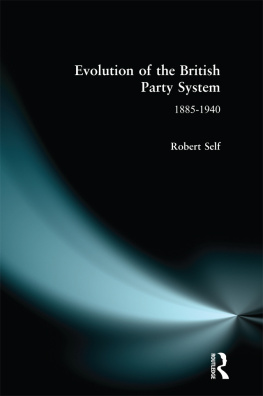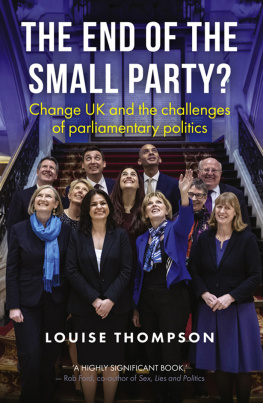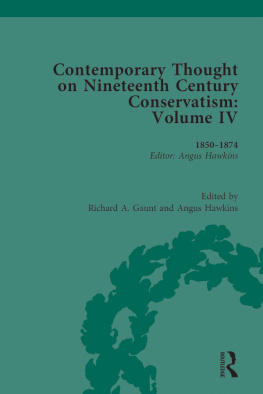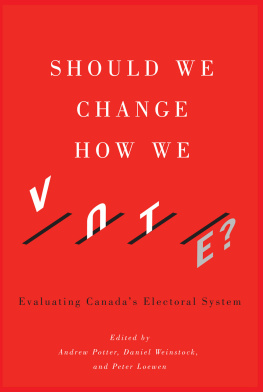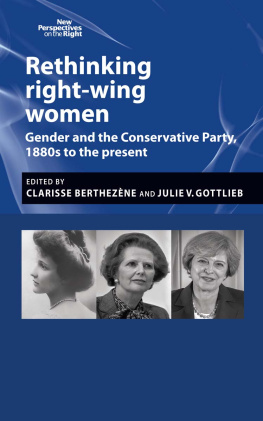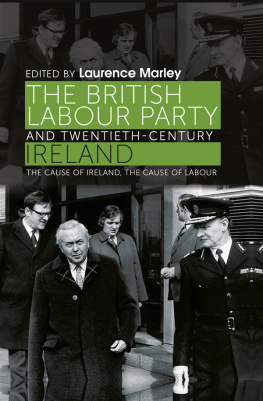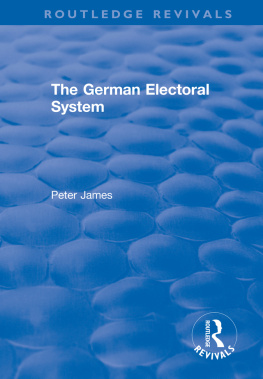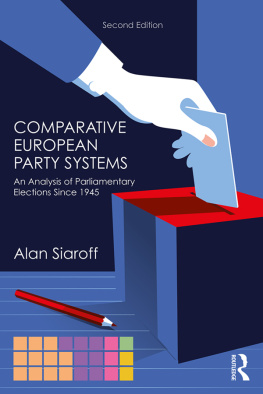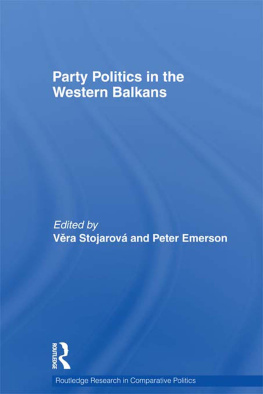The Evolution of the British Party System 1885-1940
The Evolution of the British Party System 1885-1940
Robert Self London Guildhall University
First published 2000 by Pearson Education Limited
Published 2014 by Routledge
2 Park Square, Milton Park, Abingdon, Oxon OX14 4RN
711 Third Avenue, New York, NY 10017, USA
Routledge is an imprint of the Taylor & Francis Group, an informa business
Copyright 2000, Taylor & Francis.
The right of Robert Self to be identified as author of this work has been asserted by him in accordance with the Copyright, Designs and Patents Act 1988.
All rights reserved. No part of this book may be reprinted or reproduced or utilised in any form or by any electronic, mechanical, or other means, now known or hereafter invented, including photocopying and recording, or in any information storage or retrieval system, without permission in writing from the publishers.
Notices
Knowledge and best practice in this field are constantly changing. As new research and experience broaden our understanding, changes in research methods, professional practices, or medical treatment may become necessary.
Practitioners and researchers must always rely on their own experience and knowledge in evaluating and using any information, methods, compounds, or experiments described herein. In using such information or methods they should be mindful of their own safety and the safety of others, including parties for whom they have a professional responsibility.
To the fullest extent of the law, neither the Publisher nor the authors, contributors, or editors, assume any liability for any injury and/or damage to persons or property as a matter of products liability, negligence or otherwise, or from any use or operation of any methods, products, instructions, or ideas contained in the material herein.
ISBN 13: 978-0-582-38176-6 (pbk)
British Library Cataloguing in Publication Data
A CIP catalogue record for this book can be obtained from the British Library.
Typeset by 7 in 11/12pt Garamond
For Katie - as always
A large number of debts are incurred in the preparation of a volume of this sort. First, a study of this breadth would never be possible without the specialist monographs and articles of the many historians whose work is, I hope, fully acknowledged in the Notes and References. Secondly, I am extremely grateful to a variety of librarians, archivists and the owners of manuscript collections which I have consulted and which have, whether directly or indirectly, helped shape the judgements in this volume. For access and/or permission to quote from material in privately owned collections I am obliged to Viscount Addison, Earl Baldwin of Bewdley, the Syndics of Cambridge University Library, the Master and Fellows of Churchill College, Cambridge, the Earl of Halifax, Vice-Admiral Sir Ian Hogg, Mrs A. Stacey and the Trustees of the Bridgeman family archive and the Keeper of the Public Records. I have also consulted and quoted from collections held by a number of other libraries and institutions, namely Birmingham University Library, the Birmingham Central Library, the Borthwick Institute of Historical Research, the British Library, the Bodleian Library, Cambridge University Library, the House of Lords Record Office, Newcastle University Library, the Public Record Office and the Scottish Record Office. I apologise to any copyright holder whom I have inadvertently failed to contact or trace. Finally, debts of a more personal kind also exist. I am particularly grateful to Professor Iwan Morgan, Dr Justin Fisher and Robert Walsh a for their advice, comments and useful pieces of information. I also owe much to my friend and former colleague Don Minter who so regularly persuaded me that there was a niche for such a book. The usual disclaimers apply about all remaining errors of fact, analysis and interpretation. Above all, however, I am (as always) deeply grateful to Katie without whom this work would never have seen the light of day.
Chapter one
Introduction
'The party tie is the strongest sentiment in this country stronger than patriotism or even self-interest', Joseph Chamberlain told Lord Randolph Churchill in December 1886. Many were undoubtedly disappointed and alarmed by this sort of 'non-rational' basis for electoral behaviour in the emerging new democracy, but few were prepared to deny the intensity of the tribalistic collective passions that such labels and images were capable of arousing. Before the Great War, the novelist Robert Tressell noted in The Ragged Trousered Philanthropists, that in Edwardian elections
people forgot all about unemployment and starvation, and became enthusiastic about 'Grand Old Flags' ... all that mattered was to score off their hated 'enemies' their fellow countrymen the Tories, and carry the grand old flag to victory. The fact that they had carried the flag to victory so often in the past without obtaining any of the spoils, did not seem to dampen their ardour in the least.
In his classic work on Popular Government in 1885, Sir Henry Maine attributed this fierce partisanship more to 'a survival of the primitive combativeness of mankind than a consequence of conscious intellectual differences'. Twenty years later, Sidney Lowe also noted in similarly militaristic terms the uncompromising fashion in which party attachments were placed at the centre of British political life.
The parties ... instead of being two groups of believers endeavouring to propagate their own particular faith, are two armies of active combatants, each desiring above all things to follow its own chosen champion to victory. Not the defeat of a principle, but the defeat of a leader and his 'side' is the really mortifying thing.
The party sentiment which mattered so much to late Victorians and Edwardians continued to dominate British political life for much of the
Yet although it can scarcely be denied that organised parties have a long history, there can be relatively little dispute that the roots of the modern British party system and recognisably modern parties can be traced back to the critical events of the mid-1880s, as a direct response to the challenge of the new mass politics inaugurated by developments in electoral law which took place after 1867 and culminated in the reforms of 1883-5. In many respects, the general election of 1880 represented a significant watershed in this development insofar as 'it was the first general election fought on a national level; it was the last to be disgraced by widespread corrupt practices'.
The mid-1880s also inaugurated a new era of party alignments built around redefined doctrinal cleavages. Although academic commentators and practising politicians have traditionally celebrated the essential 'naturalness' of the two-party system as a permanent feature of British political life, The Irish Home Rule crisis in 1886 was central to this transformation. Although initially enfeebled by schism and defection, over the next twenty years, a purged and radicalised Liberal party constructed a Progressive Alliance which harnessed Irish Nationalists and the newly established Labour party in order to dominate Edwardian politics. For their Tory opponents, the mid-1880s were a period of equally radical realignment. The death of Disraeli in 1881 and the succession of Lord Salisbury marked a distinct watershed between half a century of political failure and impotence as an irrelevant 'Country party' and the beginning of two decades of remarkable electoral ascendancy. Supported by dissentient Liberal opponents of Home Rule, the new Unionist alliance under Salisbury rapidly emerged as the defender of the social order and all forms of property against Gladstonian Radicals, socialists, confiscatory taxation and the encroachment of the State. In the wings, the 1880s also witnessed an upsurge of rural radicalism, the 'socialist revival' and the growth of a 'New Unionism more receptive to socialist ideas and leadership. In 1884, both the moderate Fabian Society and the avowedly Marxian Social Democratic Federation were established to campaign for their own particular brands of socialism. Four years later Keir Hardie established the Scottish Labour Party and the Independent Labour Party followed in 1893, at a time when a ferocious employer counter-offensive spurred by economic depression began to convert older craft: unions to the cause of independent labour representation. From these modest beginnings the Labour party grew eventually to supersede the Liberals and to form its first government in 1924, less than a quarter of a century after its birth.

